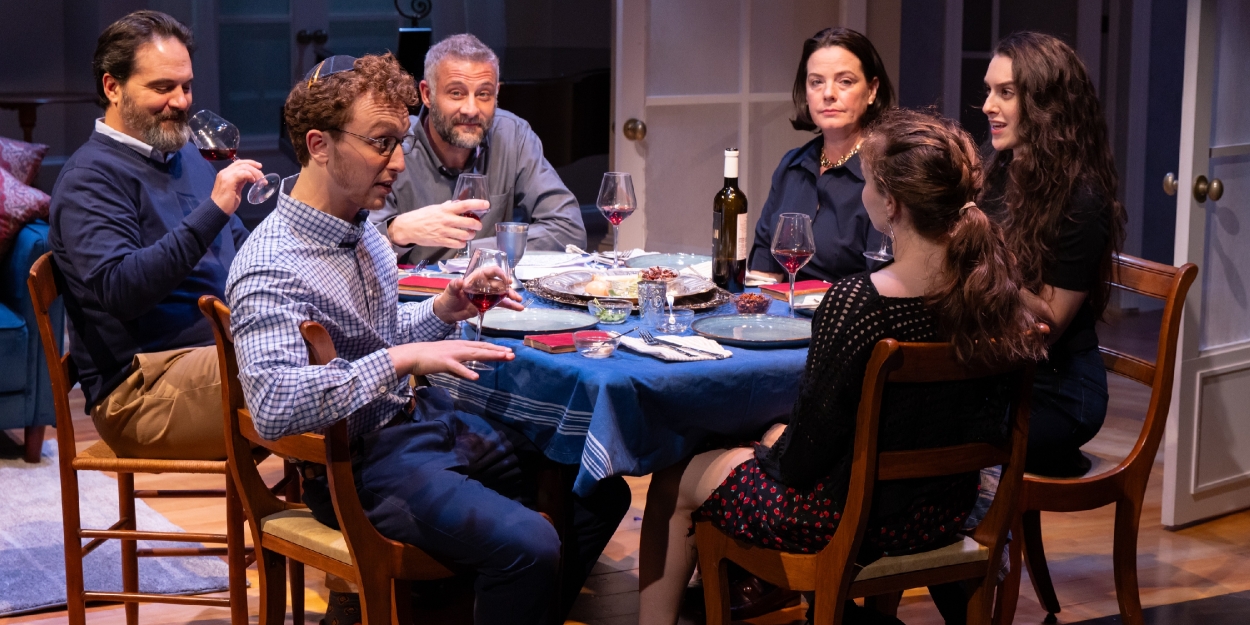Review: PRAYER FOR THE FRENCH REPUBLIC at Theater J
. . . and for all republics everywhere

In an elegant coincidence (or a charming conspiracy by the theatre gods), DC audiences will be able to see two absolutely engrossing plays about Jewish family life in 20th and 21st century Europe, back to back: Tom Stoppard's Tony award-winning Leopoldstadt next month at the Shakespeare Theatre and Joshua Harmon's Drama Desk award-winning Prayer for the French Republic through November 24 at Theater J. Crisply directed by Hayley Finn, the flawless cast of nine earned the remark overheard after opening night when an audience member said that she couldn't believe the performance had lasted 3 hours because it had only felt like 10 minutes.
Harmon packs information as well as emotion into his excellent script. Prayer for the French Republic takes place in Paris in both 2016 and 1944--each a year marked by violence and persecution of French Jews in their homeland where sabbath services in synagogues have included a weekly prayer for the country since 1808 (hence, the title). Following the French Revolution, France gave its Jewish population full citizenship, the first European country to do so. Harmon's play voices the fear those citizens now feel because of increased anti-semitism. (The European Union recorded 808 anti-semitic actions/threats in France during 2015; between 2002 and 2022, that number never fell below 300 per year.)
The Salomon/Benhamou family of the play make a microcosm of very many Jewish families--some members are observant, some are secular, some are proud of their religious and cultural history, some wish they knew more of their personal and family history, some are anxious about the rising anti-semitism, some have been the victims of it, some are hopeful of the protection their democracy offers, and some are cynical that it can continue to protect. They argue with each other, often bitterly, and they unite in their love and support for each other. They also ask unanswerable questions, such as, "Why do they hate us?" and "Where can Jews stay safe?" And they live with the constant reply that Jews, globally, continue to be singled out as somehow not full citizens. Nevertheless, Prayer for the French Republic never becomes bleak.
Harmon wisely intersperses the play with monologues that enable each actor the opportunity to reveal much about their characters' inner lives. And this is why the play makes time fly; in these solos, the audience obtains inside information on what makes a character tick which, in turn, sheds detailed light on their interactions with their family members. Watching each character find strength, joy, survival tools while realistically struggling with trouble gives Prayer for the French Republic its superpowers.
Danielle Skraastad plays Marcelle Salomon as a force of nature. An urbane, mental health professional, Marcelle cannot fathom a life outside of France; but her brilliant mind has to accept the facts that hate-crimes threaten her and her family. As her daughter, Elodie, Dani Stoller reflects her mother's forcefulness and adds her own unique strength. In Act II, Stoller performs a remarkable set piece (she's upbraiding the family's distant American cousin Molly, visiting often while she attends her university year abroad in Nantes). Elodie may suffer from manic-depression, but she also sees and articulates the family's dilemmas and the struggles of Jews everywhere more clearly than any family member. Ethan J. Miller excels in a dual role as Marcelle's son Daniel and as Daniel's great-grandfather, Holocaust survivor Lucien Salomon. Miller effortlessly ages from a 26 year old high school teacher to the middle-aged father of a traumatized 15 year old son and back again whenever the play shifts between 1944 and 2016. Brigid Cleary must depict Lucien's terrified mother who does not know where some members of her extended family are until World War II ends; then later, she must express the contentment of a woman who has come through great trouble without losing her capacity for happiness. Ariel Eliaz, as Marcelle's husband, Charles, is the first family member to suggest that leaving France for Israel might make them all safer; Eliaz gives him all the ambiguity that fear can cause and all the gentleness that fatherhood endows. Charles is one of the best husbands ever written. Cody Nickell, as Marcelle's brother, masterfully switches from equal participation in the routine family arguments to narrating for Harmon, who wants the audience to know stuff, but doesn't ever want to make the play a history lesson.
Misha Kachman's lovely design for the 2016 Parisian apartment of the Benhamous saves space for use as the smaller flat of the 1944 Salomons. And Colin K. Bills' lighting design orients both times and spaces. Bills also makes sure the lighting is the right time of day, an important element of Jewish worship at home. Danielle Preston's costumes quietly support each actor: Elodie wears T-shirts and leggings and then barely wears at least something neutral for Passover seder; Irma (Cleary's character) has a perfect, cotton, 1940s housedress; Marcelle wears designer tops for work days and Shabbos and satiny pajamas for sitting around.
Prayer for the French Republic can't help being something of a history lesson, but crafted as a family story with universality and contemporary awareness, Finn and her company at Theater J have carefully attended to every detail and moment of 3 hours, very much worth spending.
[Photo L-R of Cody Nickell (Patrick), Ethan J. Miller (Daniel), Ariel Eliaz (Charles), Danielle Skraastad (Marcelle), Jourdan Lewanda (Molly), Dani Stoller (Elodie) by Ryan Maxwell Photography]
Reader Reviews

Videos

